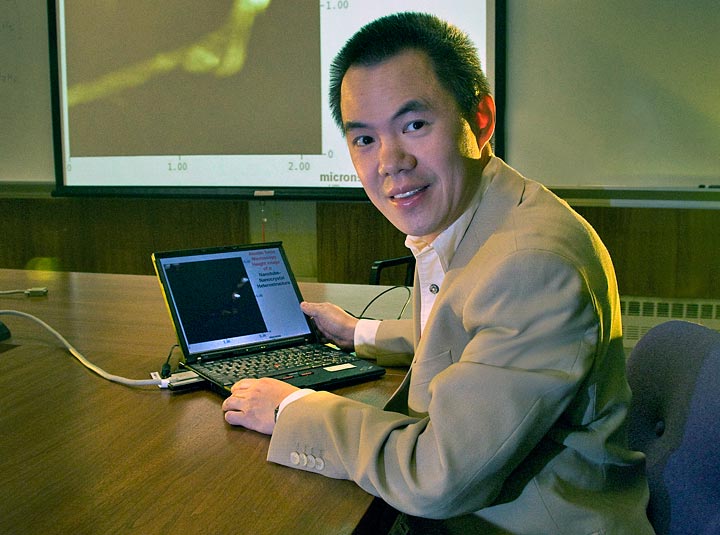Brookhaven's Stanislaus S. Wong to Receive the 2015 ACS Inorganic Nanoscience Award
May 14, 2015
The American Chemical Society's 2015 Inorganic Nanoscience Award will be presented to Stanislaus S. Wong, a chemist in the Condensed Matter Physics and Materials Sciences Department at the U.S. Department of Energy’s Brookhaven National Laboratory and a professor in Stony Brook University's Department of Chemistry.
The award, which is sponsored by the University of South Carolina’s NanoCenter, recognizes “sustained excellence, dedication, and perseverance in research in the area of inorganic nanoscience.”
“I am sincerely humbled by and truly appreciative of this prestigious honor,” said Wong. “Moreover, it represents a culmination of the sustained efforts of my group over many years. Hence, I am both pleased and grateful that the community has recognized our collective contributions to inorganic nanoscience.”
"I am both pleased and grateful that the community has recognized our collective contributions to inorganic nano science.”
— Brookhaven Lab and Stony Brook University physicist Stan Wong
Wong's work centers on carbon nanotube chemistry and novel nanostructure synthesis. His goal is to broaden the impact and interdisciplinary applicability of nanostructures, in areas from electronics to nanomedicine, with a special emphasis on energy-related systems, such as solar cells, fuel cells, and batteries. Among the many themes of his research is carbon nanotube functionalization, in which protocols have been developed to “tailor” the nanotubes' catalytic, electronic, and photophysical properties. This work helps to advance the use of carbon nanotubes in novel technologies by addressing key challenges facing their incorporation into practical, functional devices.
More recently, he and his group have been interested in creating multi-functional inorganic nanomaterials using diverse, broadly applicable solution-based strategies. The idea is that the unique and desirable properties of individual nanomaterial components can be significantly enhanced in potentially unforeseen ways by combining them into novel composite “heterostructures.” This approach is based on the concepts that the whole is often more interesting than the sum of its individual parts and that favorable structure-property correlations can be “dialed in” using rational chemical synthetic design.
In the past, he and his team conducted a number of studies at the former National Synchrotron Light Source (NSLS) using x-rays to probe the surface chemistry, diffraction properties, electronic structure, and other physico-chemical characteristics of carbon nanotubes, inorganic metal oxides, and a host of related nanomaterials. This type of research is expected to continue at Brookhaven Lab’s new light source, NSLS-II.
Wong will receive the award, which consists of $3000 and a plaque, at the August ACS meeting in Boston.
Brookhaven National Laboratory is supported by the Office of Science of the U.S. Department of Energy. The Office of Science is the single largest supporter of basic research in the physical sciences in the United States, and is working to address some of the most pressing challenges of our time. For more information, please visit science.energy.gov.
2015-5662 | INT/EXT | Newsroom










